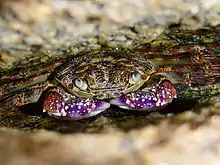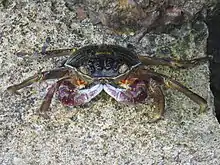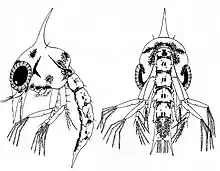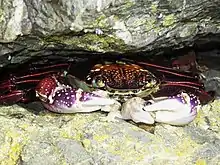| Leptograpsus variegatus | |
|---|---|
 | |
| Scientific classification | |
| Domain: | Eukaryota |
| Kingdom: | Animalia |
| Phylum: | Arthropoda |
| Class: | Malacostraca |
| Order: | Decapoda |
| Suborder: | Pleocyemata |
| Infraorder: | Brachyura |
| Family: | Grapsidae |
| Genus: | Leptograpsus H. Milne-Edwards, 1853 |
| Species: | L. variegatus |
| Binomial name | |
| Leptograpsus variegatus (Fabricius, 1793) | |
Leptograpsus variegatus, known as the purple rock crab, is a marine large-eyed crab of the family Grapsidae, found in southern subtropical Indo-Pacific Oceans.[1] It grows to around 50 millimetres (2.0 in) shell width.[1] It is the only species in the genus Leptograpsus.[2]
Taxonomy
Leptograpsus variegatus was first described in 1793 as Cancer. variegatus.[3] In 1803, C. variegatus was moved to the Grapsus genus and became Grapsus variegatus.[4] In 1818, 1842 and 1852, L. variegatus was described again as Grapsus personatus, Grapsus strigilatus and Grapsus planifrons.[5][6][7] In 1853, Henri Milne-Edwards erected the Leptograpsus genus and used G. variegatus as the type taxon.[8] In his publication, Milne-Edwards recognized G. personatus, G. strigilatus and G. planifrons to be synonyms of L. variegatus.[8] Milne-Edwards also described Leptograpsus ansoni, Leptograpsus gayi and Leptograpsus verreauxi, however these would later also be recognized as synonyms of L. variegatus.[9]
Description

Individuals are large and may have a carapace that reaches up to 50mm in width.[10] The crab has an overall purple colouration with a variable amount of white patterning when mature. Juveniles are a bluish grey colour with black patterning. The carapace is shaped somewhat like a square and eyes are relatively short. The body is smooth overall with no hairs.[11]
When immature, the eggs are about 0.36mm in diameter and have a very dark brown colour. When the eggs are about to hatch, they are roughly 0.44x0.42mm and the eggs are light brown.[12]
The first zoea of the crab are about 1.31mm in length.

Distribution/habitat
Leptograpsus variegatus is known to occur in Australia (from western Australia to southern Australia), South America (from Peru to Chile), New Zealand and numerous islands in the Pacific Ocean.[10] The crab lives in upper intertidal rocky zones and is often spotted running along exposed rock, hiding in cracks or under boulders.[11]
Life history
Adult females are known to carry eggs only in December. The females will incubate the eggs for roughly six weeks.[12]
Prey
Leptograpsus variegatus is an omnivore and will eat a broad range of plant and animal life. While the crab may eat algae growing on rocks (such as Corallina and Ulva lactuca), they have also been observed feeding on barnacles and limpets. The crab captures limpets by quickly placing their chelae under the limpets shell when it begins to move and then flips it over.[13] Notably, there is also a single observation of this species preying upon a Raukawa gecko, which is native to New Zealand.[14]

References
- 1 2 "Grapsidae". SeaFriends. Retrieved 22 January 2012.
- ↑ Peter Davie (2010). "Leptograpsus H. Milne Edwards, 1853". WoRMS. World Register of Marine Species. Retrieved 22 January 2012.
- ↑ FABRICIUS, J. C. 1793. Entomologia systematica emendata et aucta, secundum classes, ordines, genera, species, adjectis synonymis, locis, observationibus, descriptionibus. C. G. Proft, Hafnia. Vol. 2: pp. VIII, 1519
- ↑ LATREILLE, P. A. 1803. Histoire naturelle, generale et particuliere, des crustaces et des insectes. Paris. Vol. 6: pp. 391, 44 pis.
- ↑ LAMARCK, J. B. P. A. DE, 1818. Histoire naturelle des animaux sans vertebres, presentent les characteres generaux et particuliers de ces animaux, leur distribution, leurs classes, leurs families, leurs genres, et la citation des principales especes ..• etc. Paris. Vol. 5: pp. 612.
- ↑ WHITE, A. 1842. Description of an orthopterous Insect and two new species of Crustacea, from New Zealand: In the collections of the British Museum. In J. E. Gray (ed.), The Zoological Miscellany. London: 78–79.
- ↑ DANA, J. D. 1852. Crustacea. In United States exploring expedition during the years 1838–1842 under the command of Oharles Wilkes, U.S.N. C. Sherman, Philadelphia. Vol. 13: pp. XIII, 1618. Atlas (1855), pp. 27, 96 pis.
- 1 2 MILNE EDWARDS, H. 1853. Memoire sur Ia famille des ocypodiens. Annales des Sciences Naturelles, Zoologie (3), 20: 165–228, pis 6–11.
- ↑ WoRMS (2020). Leptograpsus variegatus (Fabricius, 1793). Accessed at: http://marinespecies.org/aphia.php?p=taxdetails&id=444462 on 2020-03-23
- 1 2 Griffin, Dr D. J. G. (1 September 1973). "A revision of the two southern temperate shore crabs Leptograpsus variegatus (Fabricius) and Plagusia chabrus (Linnaeus) (Crustacea, Decapoda, Grapsidae)". Journal of the Royal Society of New Zealand. 3 (3): 415–440. doi:10.1080/03036758.1973.10421866. ISSN 0303-6758.
- 1 2 "Coastal Crabs a guide to the crabs of New Zealand Version 1 2015" (PDF). NIWA.
- 1 2 Wear, Robert G. (1 March 1970). "Life‐history studies on New Zealand Brachyura". New Zealand Journal of Marine and Freshwater Research. 4 (1): 3–35. doi:10.1080/00288330.1970.9515324. ISSN 0028-8330.
- ↑ Skilleter, G. A.; Anderson, D. T. (1986). "Functional morphology of the Chelipeds, mouthparts and gastric mill of Ozius truncatus (Milne Edwards) (Xanthidae) and Leptograpsus variegatus (Fabricius) (Grapsidae) (Brachyura)". Marine and Freshwater Research. 37 (1): 67–79. doi:10.1071/mf9860067. ISSN 1448-6059.
- ↑ Bell, Trent & Bauer, A.. (2017). Predation on a free-ranging Raukawa gecko (Woodworthia maculata) by a purple rock crab (Leptograpsus variegatus). BioGecko. 20 – 25.
Further reading
Griffin, D. J. G. (1973). "A revision of the two southern temperate shore crabs Leptograpsus variegatus (Fabricius) and Plagusia chabrus (Linnaeus) (Crustacea, Decapoda, Grapsidae)". Journal of the Royal Society of New Zealand. 3 (3): 415–440. doi:10.1080/03036758.1973.10421866.
Campbell, N. A.; Mahon, R. J. (1974). "A multivariate study of variation in two species of rock crab of the genus Leptograpsus" (PDF). Australian Journal of Zoology. 22 (3): 417–425. doi:10.1071/ZO9740417.
Davie, P. J. F. (1983). Zoological Catalogue of Australia. Canberra, Australia: CSIRO. pp. 215–216. ISBN 9780643067929.